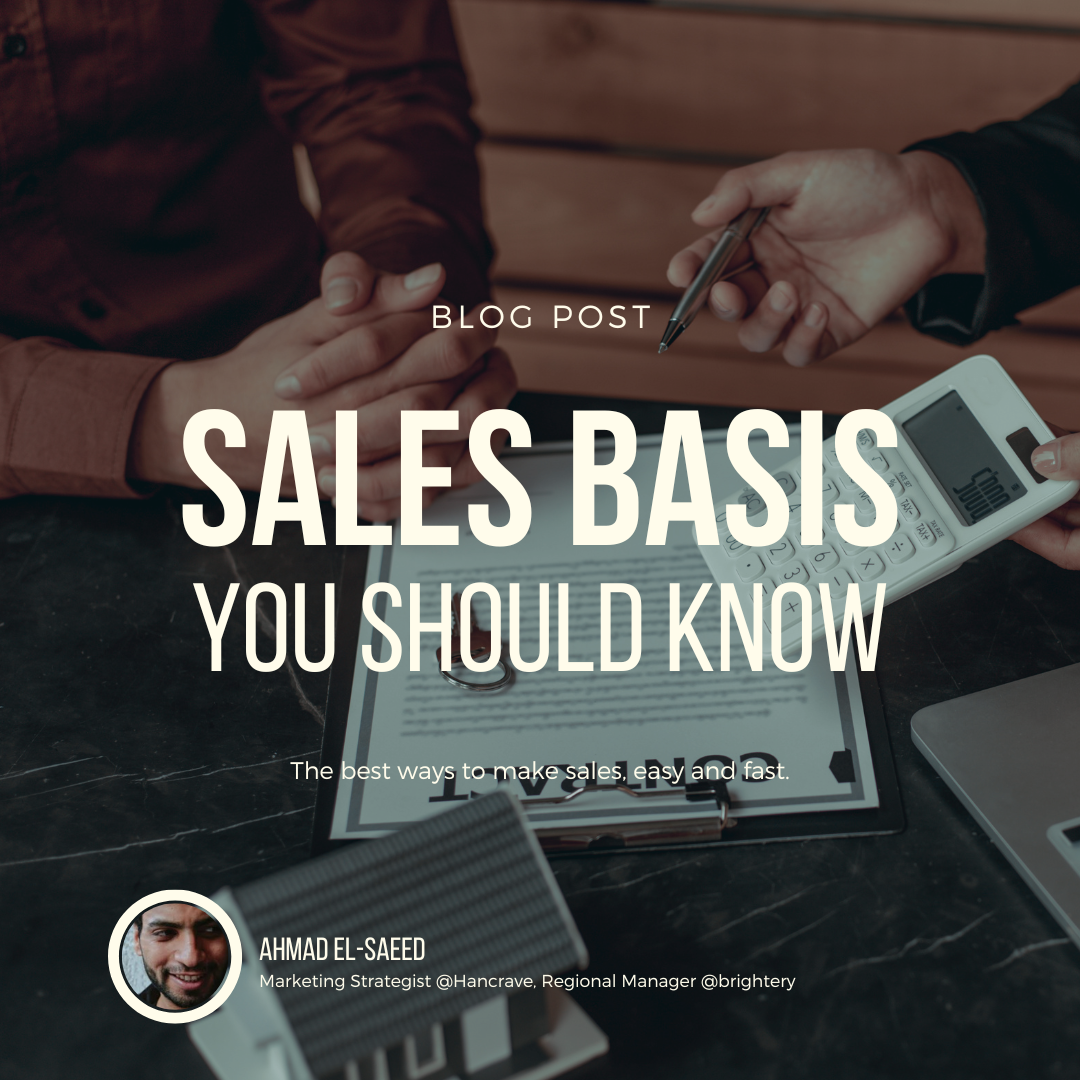
The 16 Sales Basis and laws
Everyone wants to be an expert salesperson, but how can you be a real great salesperson without learning the basics and the most important steps of being a salesperson? in this post I'm going to breakdown the top 16 steps of being a salesperson for new salespeople and even experts.
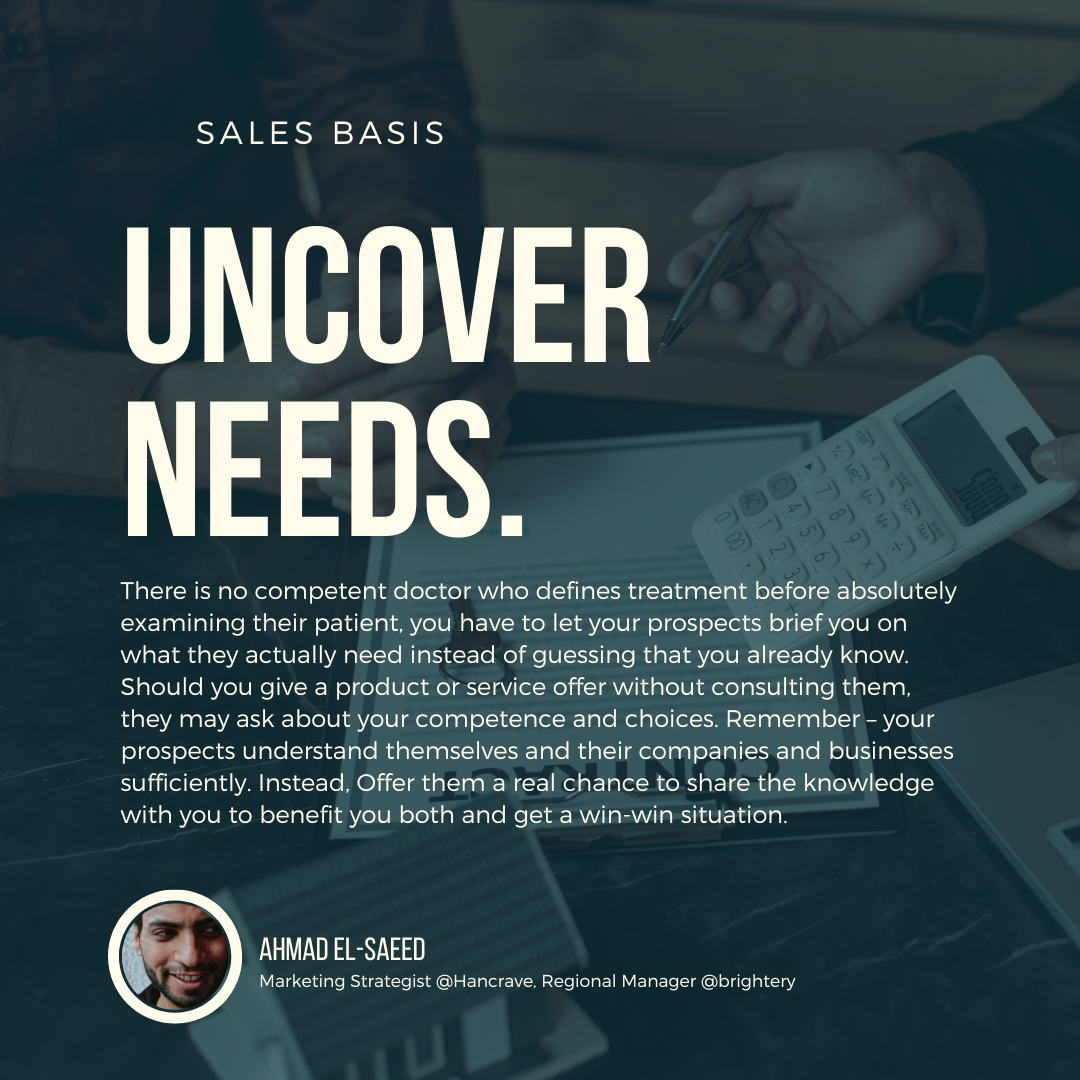
Uncover needs.
There is no competent doctor who defines treatment before absolutely examining their patient, you have to let your prospects brief you on what they actually need instead of guessing that you already know. Should you give a product or service offer without consulting them, they may ask about your competence and choices. Remember – your prospects understand themselves and their companies and businesses sufficiently. Instead, Offer them a real chance to share the knowledge with you to benefit you both and get a win-win situation.
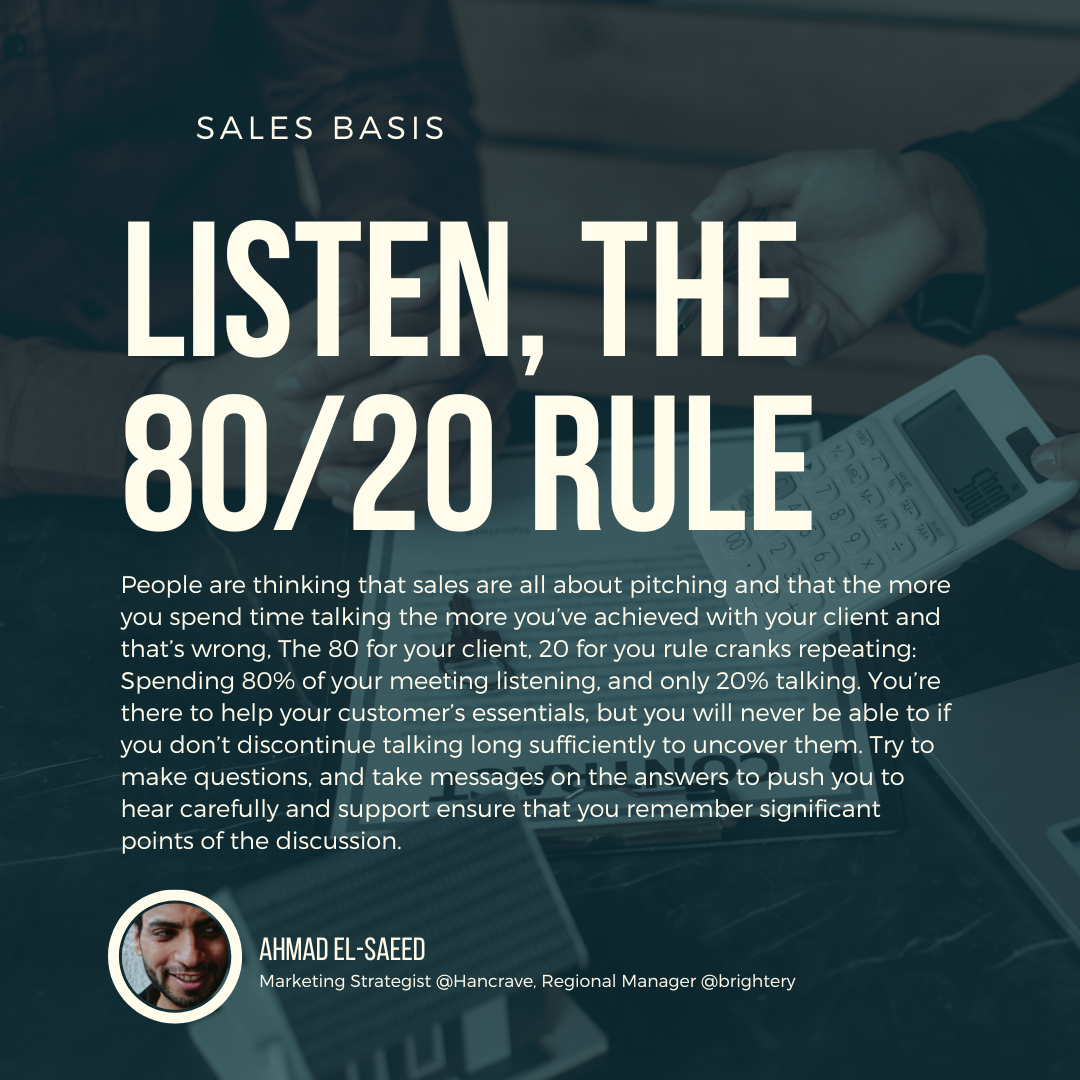
Listen, The 80/20 Rule.
People are thinking that sales are all about pitching and that the more you spend time talking the more you’ve achieved with your client and that’s wrong, The 80 for your client, 20 for you rule cranks repeating: Spending 80% of your meeting listening, and only 20% talking. You’re there to help your customer’s essentials, but you will never be able to if you don’t discontinue talking long sufficiently to uncover them. Try to make questions, and take messages on the answers to push you to hear carefully and support ensure that you remember significant points of the discussion.
We've all listened to the "2 ears 1 mouth" quote, it's such a powerful and critical principle for winning in selling. It's only by hearing that you build connections, it's only by listening that you recognise real concerns and buyer problems, and it's exclusively by listening that you can find buying signals and complete the sale.
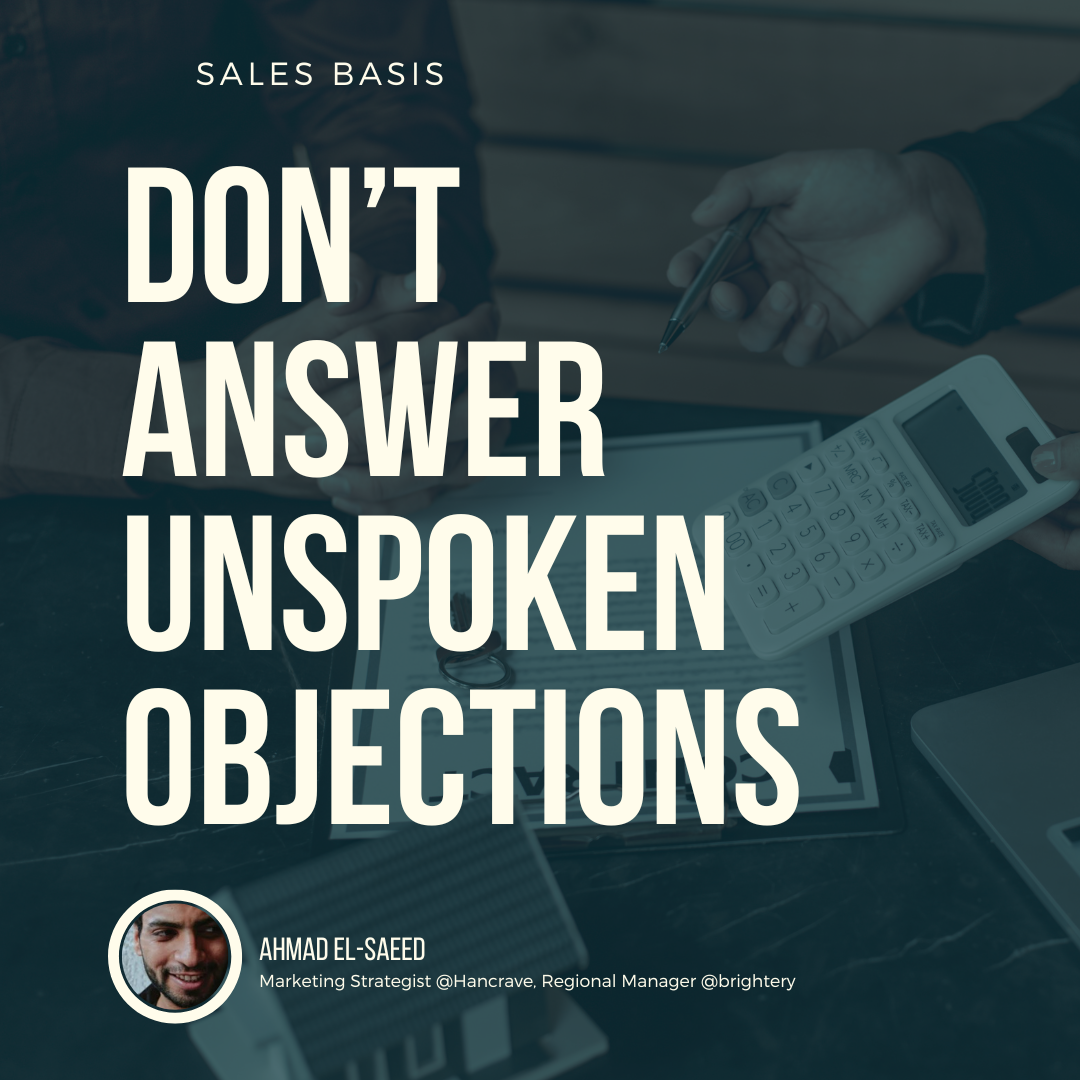
Don’t answer unspoken objections.
When clients say their problems, uncover the entire issue by questioning why they raised that point. You never understand just how your prospects know about your services and products, so don’t volunteer info they may sense as being negative and make them think about reconsidering your services or products.
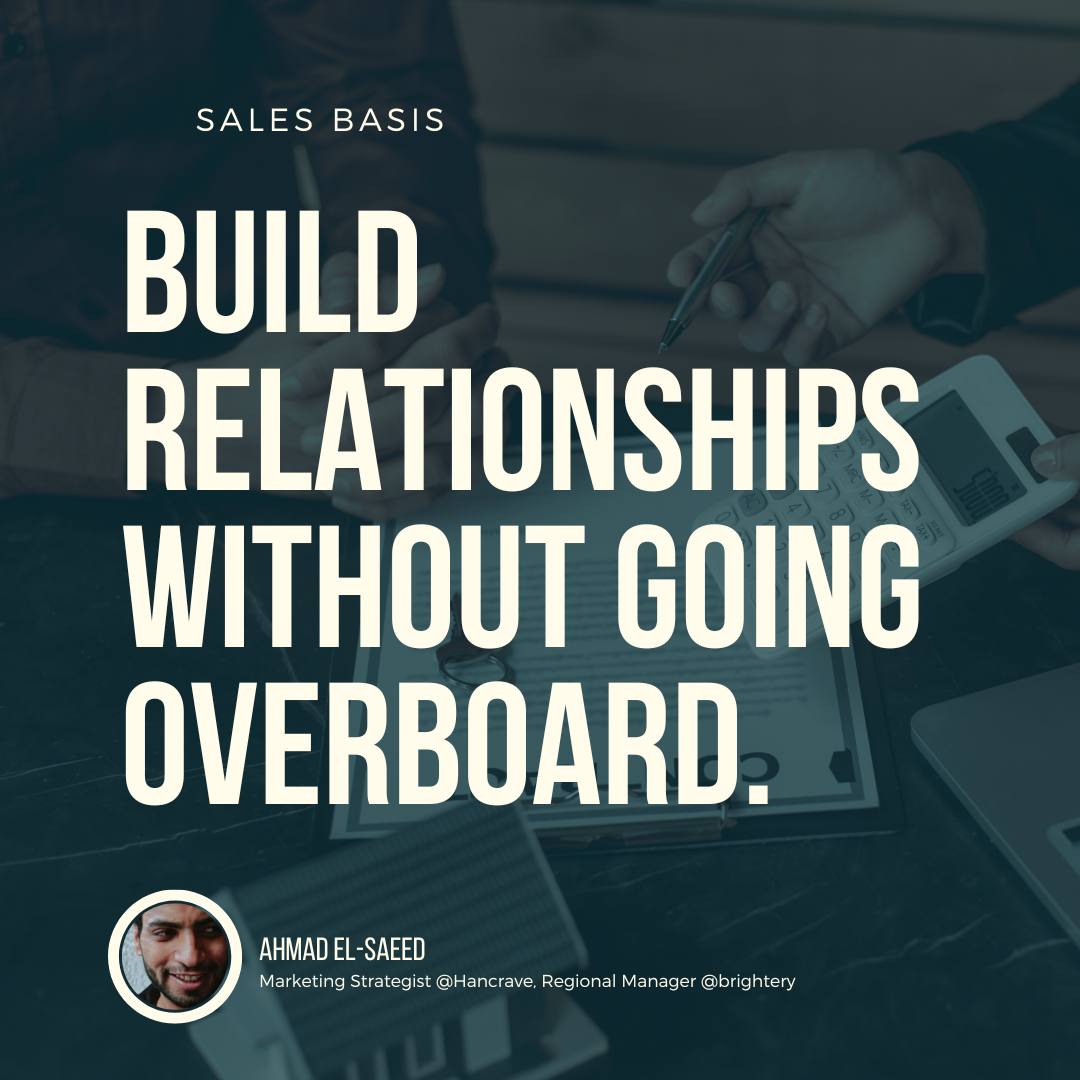
Build relationships without going overboard.
Agents who push too hard to make pals with their potential customers may be doing more additional harm than right. Most competitors want a salesperson who resolves to be an informative industry resource, problem solver and dedicated business partner – not a golf buddy. Stick to impressing possible customers with your honesty and qualifications instead of your winning personality.
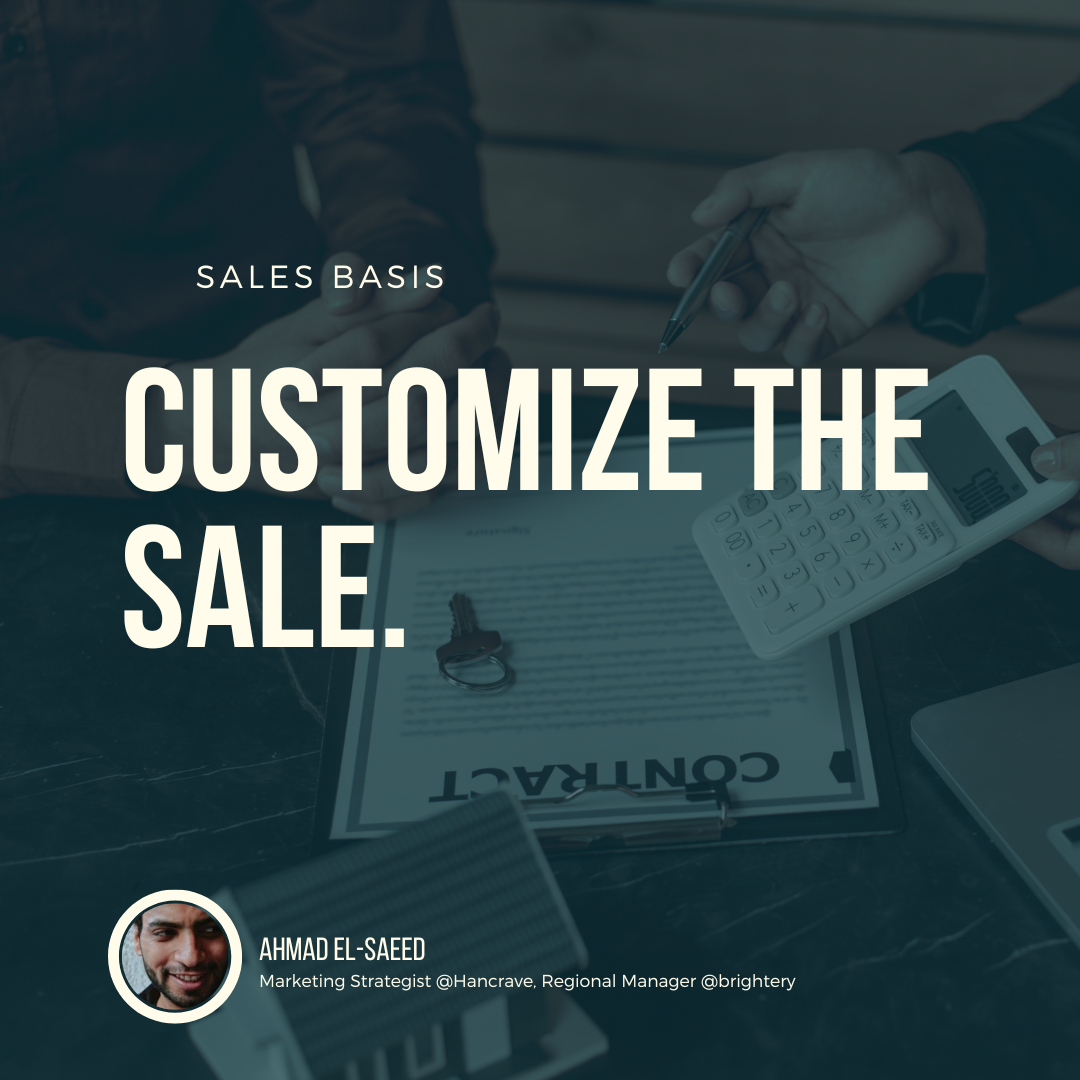
Customize the sale.
We all want to be treated like the unique, special individuals that we are, so tailor your selling technique to suit each of your clients and customers. To keep them comfortable and happy, mark their personality and character closely, then guide yourself accordingly. The more your consumers feel like the centre of your attention, the more possible they are to return for more of the VIP treatment.
If you want to make a sale, identify the problem, and don’t break down your features
To succeed in sales you require to make the entire thing about their concern or their motivation for buying and not near your products or services. Their requirement should consistently come first with your service and product then responding to the problem they have. The key to victory in sales and a code that will matter for all shapes of selling is the need to identify the pain after the buying conclusion. Why do they enjoy or need this service or product?
Individuals will purchase for emotional reasons which they then support and justify with logic. The trick is to determine the situation and tap into the emotional part of the buying decision, then explain it with the value, features, benefits etc.
There is no sale unless you can close it.
We all love a large pipeline, and we all love to brag about the amazing chances that we're working on, the big clients we're targeting, and the challenging work we're putting in. Unfortunately one of the key regulations of selling is the truth that there is NO sale unless you complete it. All of that effect is great and part of the operation, but success in sales won't reach from the size of your channel or the hard work you're placing in, it arrives from actually selling!
It accomplishes value what you're selling, where you're selling or who you're marketing to, your capacity to succeed in sales will still come down to your power to close deals and really sell!
They can’t hurt you.
This is perhaps the most psychologically significant of all the sales basics on this list. Clients can’t physically hurt you. They hold no physical authority over you. And they can force you to no physical injury. In order to create a strong sales basis, you must first persuade yourself of this fact: prospects can’t hurt you.
I understand it’s difficult. We’ve all existed in a sales meeting or on a sales call when our palms start to sweat and we get actually scared. and start to freak out. What are we heading to say next? What if we mess up? This sales pressure is very familiar. All sales representatives feel fear, especially when they’re just beginning out. The ancient part of our brains tells us: “Flight now!!”
But once we receive the fact that they can’t cause us any real damage, we can start to override this unproductive anxiety. The more you remind yourself that they can’t harm you, the less worried you’ll be in any selling condition, and the more powerful you’ll be in sales.
Have a system.
Observing a methodical approach is a sales basis that’s important for sales success. There’s no such something as a born salesperson. I’ve met individuals who learn really nicely and become great salespeople fast, but I’ve never met somebody who was just born a great salesperson without any practice or hard work. The key is to pick an established selling approach and follow it thoroughly. Don’t try to makeshift your own approach by dragging ideas from 100 different places. Follow a method and technique and use it every single time.
The first 30 seconds are the most important part.
Imagine yourself in an elevator with an ideal prospect, somebody who you’d love to have a discussion with. They question you, “So, what do you do?” What are you proceeding to say? What will reach out of your mouth over the following 25 to 30 seconds? Most salespeople and business owners have no clue what they’re heading to say. And what completes up occurring is that they drone on and on, wandering all over the place.
This is a whole mess. You need to know precisely what your sooner 30 seconds will be. type it out, remember it, and own it. Because if you don’t get what to do in the first 30 seconds, you’re never going to compel your prospect to break through to that next level of conversation with you. Your first 30 seconds are the sale.
You’re important, But not that important
Newer salesperson specialists tend to focus a lot on themselves, as objected to the prospect. But all the prospect cares about is what’s going on in their world. They don’t really care about you. They don’t overlook your company. They don’t give a Sh** about your product or service, or your offering. All they care about is themselves. And you know something? That’s the way it should be.
It’s really essential that, as a salesperson, you comprehend that prospects don’t care about you. Maybe your clients do. Possibly you have some really good client connections—that’s great. But your prospects do not care about you. The less attentive you are to yourself, and the more focused you are on them, the more likely you are to really engage them in a valuable, meaningful business conversation.
Selling is all about relationship-building.
Whatever happens, you need to create a solid relationship with your client, if they’re not interested in investing time or money with you now, they will do this later.
The customer is a human, just like you are.
According to Joe Girard, the customer is just a human, just like you, you don’t have to make a big deal out of your relationship with your customers, they just want someone nice to talk to, flex, and listen to what they complain about.
If you’re an active listener you can achieve more than just make a deal with your customer, you can create a solid relationship with your customer.
You can also read this for more information about (how to sell anything to anyone - Joe Girard)
The 250 law
Your customers are not alone in the world, they’re probably a targeted audience and your targeted audience’s friends are probably the target audience this law was confirmed from so many trusted educational institutes for marketing and sales, it says: every customer has 250 friends and relative you lose when you lose this customer.
So, when you create a solid relationship with your customer, you’re not just creating a solid relationship with them, you’re creating solid relations with their relationships.
Don’t Join the club
It’s easier to join the club and tell yourself you’re doing alright, and complain about others and your surroundings, but it’s harder to take the step and do something about your performance.

{{comments.length}} Comments
{{comment.name}} · {{comment.created}}
{{sc.name}} · {{sc.created}}
Post your comment